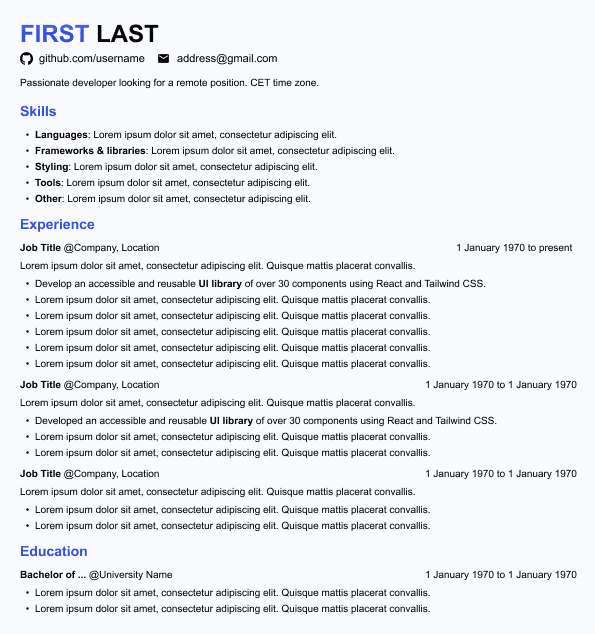The Remote Developer's guide to writing a resume
According to the most recent Stack Overflow survey, 41% of developers are fully remote. Let's take a look at some guidelines that will help you join the troops.
General best practices ✅
- Stick to one page unless you're a seasoned developer.
- Add a link to your GitHub profile, it speaks louder than words.
- Deliver the resume as a PDF. It ensures consistent formatting.
- Eliminate grammar and spelling mistakes using tools like Grammarly.
- Keep the email professional eg. firstlast@gmail.com.
- Highlight key points using bold and italics, particularly in the experience section.
- Use a relevant name for your resume file: eg. First Last.pdf
- Bulleted lists boost readability.
- Highlight visa/work permit status if applying internationally, so if you don't need a visa, mention that in the resume/cover letter.
Resume structure 📝

Opt for the A4 format.
Your resume should encompass:
- header
- skills
- experience
- education
You can further personalize your resume by adding other sections, like volunteering or interests, but the ones listed above are the most important.
Header
Feature your name, contact details, and a succinct line emphasizing that you're specifically looking for a remote position + your timezone/availability.
Skills
Group skills categorically. For instance, a frontend developer might classify as Languages, Frameworks, Tools, and more.
Experience
- Mention tech stacks used eg. Developed an accessible and reusable UI library of over 30 components using React and Tailwind CSS.
- Link to projects and past employers where possible.
- For past roles, a maximum of 3-4 bullet points suffice. Current roles can be more detailed.
- Use the present tense when describing your current position and the past tense for previous positions.
Education
- Experienced folks can keep this concise.
- Showcase notable academic achievements (scholarships, honor societies, awards, etc).
- Reference your highest relevant education, typically university onward.
Things to avoid ❌
- Complex templates, inconsistent formatting, fancy fonts, convoluted language, etc. We're not artists, let's keep it simple.
- Pictures.
- Cluttering your resume with too much information.
- 2+ column resumes.
- Self-evaluating your skills. Unless you hold a certification that has levels (eg. CEFR), it's best to leave the evaluation to the technical interviewer. If you include a skill in your resume, it should be safe to assume you have at least a working knowledge of it.
- Progress bars, ratings, graphs, and anything similar. They're too vague of a metric for the recruiter.
FAQ 🙋
City + country on the resume?
You can if you want to, but it's not necessary. Timezone typically suffices, unless you're applying to remote positions in your country.
List spoken languages?
Only if job-relevant or you speak more than English and your native language. Eg. if you're applying for a remote job at a company from France, you should mention that you speak French.
If you write your resume in English, it's safe to assume you speak English.
Phone number?
Include for local companies; optional for international roles. I've had many interviews so far, but only one company called me, and I strongly believe that happened because me and the recruiter spoke the same native language.
LinkedIn?
Valuable addition, but not mandatory. The reason why I didn't add it to the resume model posted above is because it's possible to get a job without a LinkedIn profile.
Online certifications/awards/completed courses?
A dedicated section works best, especially for freshers.
If you're a seasoned developer, you probably don't need to mention which online courses you've completed. However, if you're a junior, it's a good idea to add them alongside a summary.
Soft skills?
Your experience should inherently indicate these. Eg. if you've had a managerial position, it's reasonable to assume you have communication skills. That being said, you don't need to list your soft skills on your resume.
Interests/hobbies?
A matter of personal choice. If you have leftover space and feel like sharing a bit about yourself, go for it.
I have no work experience. What should I do?
In this case, you can replace the experience section with a projects section. If you've done any volunteering, you can add that as well. However, you should only include long-term volunteering jobs (so no one-day events).
Portfolio & GitHub insights 👨💻
A curated portfolio is a game-changer.
If short on time, you can make a profile README on GitHub where you list your notable projects. Ensure:
- Clear project names and tech stacks eg. A web3 news website:
Next.js,TailwindCSS, andwagmi. - Live demos where possible (giving frontend devs the side-eye, it takes one minute to deploy on Vercel, no excuses! 😤).
Don't forget to show your private contributions on your GitHub profile.
Alternatively, you can use templates (I recommend these from Next.js) or make your own website from scratch.
GitHub Best Practices
-
❌ Steer clear of single-commit projects.
-
✅ Add a
README.mdfile to each project with a description and instructions on how to run it. You could also list the most important features.
Should you lie on your resume? 🎭
Small omissions are forgivable. You can hide a short gap or skip mentioning a one-month position that didn't work out, but I wouldn't recommend going further than that, like adding Python to your resume if you've never used it.
Is it immoral? Yes. Is it worth lying if it will save you from an awkward conversation? Absolutely. Should you "enhance" your resume with skills or experience you don't have that are relevant to the job? Definitely not.
In the dynamic realm of remote work, your resume is your calling card. While adhering to these guidelines will ensure you present yourself effectively, remember that even with a well-written resume, it might take some time to secure a new job. Best of luck in your search! 🫶